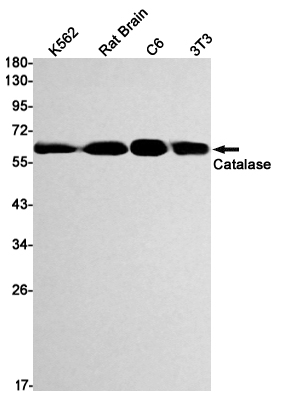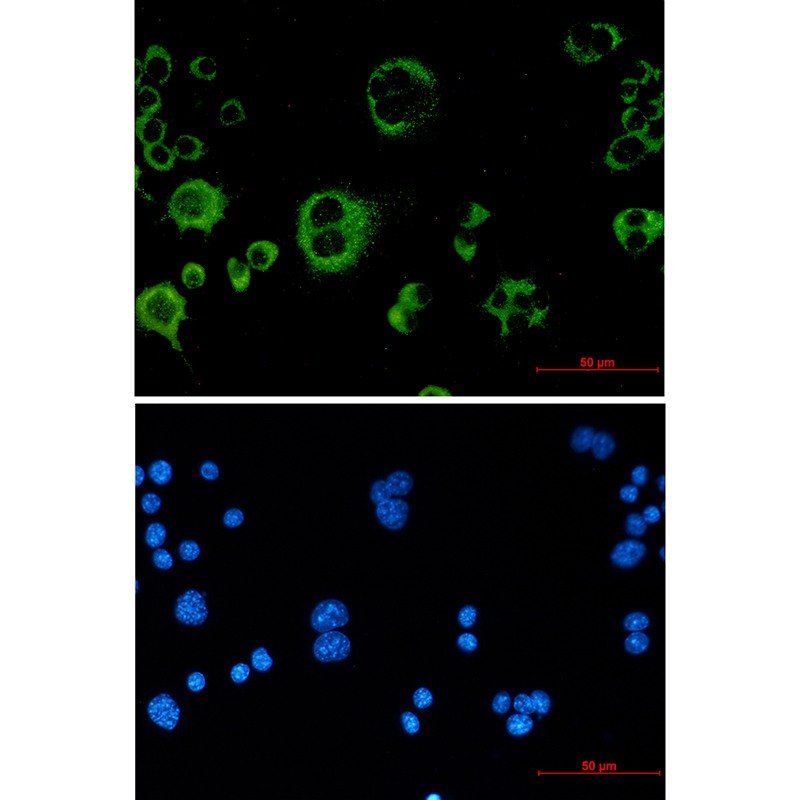

| WB | 咨询技术 | Human,Mouse,Rat |
| IF | 咨询技术 | Human,Mouse,Rat |
| IHC | 咨询技术 | Human,Mouse,Rat |
| ICC | 1/50-1/200 | Human,Mouse,Rat |
| FCM | 咨询技术 | Human,Mouse,Rat |
| Elisa | 咨询技术 | Human,Mouse,Rat |
| Aliases | Cas1; Cs-1; Cas-1; 2210418N07 |
| Entrez GeneID | 12359 |
| WB Predicted band size | Calculated MW: 60 kDa; Observed MW: 60 kDa |
| Host/Isotype | Rabbit IgG |
| Antibody Type | Primary antibody |
| Storage | Store at 4°C short term. Aliquot and store at -20°C long term. Avoid freeze/thaw cycles. |
| Species Reactivity | Human,Mouse,Rat |
| Immunogen | Recombinant protein of mouse Catalase |
| Formulation | Purified antibody in TBS with 0.05% sodium azide,0.05%BSA and 50% glycerol. |
+ +
1. **"Production and characterization of a monoclonal antibody against human catalase"**
- 作者:Yamaguchi et al.
- 摘要:该研究报道了一种针对人源过氧化氢酶的单克隆抗体的开发与验证,通过Western blot和免疫组化证实其高特异性和敏感性,适用于组织样本中过氧化氢酶的定位与定量分析。
2. **"Catalase deficiency accelerates mitochondrial dysfunction in neurodegenerative disease models"**
- 作者:Chen et al.
- 摘要:利用过氧化氢酶抗体检测小鼠脑组织中该酶的分布变化,发现其缺失加剧氧化应激导致的线粒体损伤,为神经退行性疾病机制研究提供依据。
3. **"A novel polyclonal antibody for catalase detection in plant oxidative stress responses"**
- 作者:Li & Wang
- 摘要:开发了一种植物特异性过氧化氢酶多克隆抗体,通过ELISA和免疫荧光技术验证其在拟南芥和水稻中的适用性,揭示植物在干旱胁迫下的抗氧化调控机制。
4. **"Validation of commercial anti-catalase antibodies for redox signaling studies"**
- 作者:Smith et al.
- 摘要:系统性评估了市售过氧化氢酶抗体的交叉反应性和稳定性,提出标准化实验流程以提高不同研究间数据可比性,重点应用于心血管疾病中的氧化还原信号分析。
Catalase is a crucial antioxidant enzyme that catalyzes the decomposition of hydrogen peroxide (H₂O₂) into water and oxygen, playing a vital role in protecting cells from oxidative damage. It is primarily localized in peroxisomes and is ubiquitously expressed across tissues, with high activity in the liver, kidneys, and erythrocytes. Dysregulation of catalase has been linked to various pathologies, including neurodegenerative diseases, diabetes, cancer, and aging, making it a key focus in oxidative stress research.
Catalase antibodies are immunological tools designed to detect, quantify, and visualize catalase protein in experimental settings. These antibodies are typically produced by immunizing host animals (e.g., rabbits, mice) with purified catalase protein or peptide fragments. Both monoclonal and polyclonal variants are available, each offering distinct advantages: monoclonal antibodies provide high specificity, while polyclonal antibodies often enhance sensitivity for detecting diverse epitopes.
Widely used in techniques like Western blotting, immunohistochemistry (IHC), and ELISA, catalase antibodies enable researchers to study the enzyme's expression patterns, subcellular localization, and involvement in disease mechanisms. Commercial catalase antibodies are often validated for cross-reactivity across species, including human, mouse, and rat. However, rigorous validation—using knockout controls or siRNA knockdown—is essential to confirm specificity, given potential cross-reactivity with unrelated proteins. These antibodies have become indispensable in exploring catalase's role in redox homeostasis and its potential as a therapeutic or diagnostic target.
×